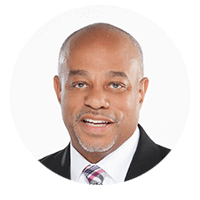Rejection and Division
In 1915, as famed baseball player-turned-evangelist Billy Sunday prepared for a Washington, D.C. crusade, Black Presbyterian Pastor Francis J. Grimké wrote to him, urging him to decry racism among other sins. Sunday never replied, and Grimké, like generations of Black Christians after him, lamented Sunday and so many other white ministers, “claiming to be ambassadors of God,” yet “sitting down quietly in the midst of this spreading leprosy of race prejudice.”
This rejection by white Christians was not new. It was true over 50 years earlier during the time of the Emancipation Proclamation, and it would remain true nearly 50 years after Sunday’s crusade when Martin Luther King Jr. faced rejection from white pastors, which led him to write the “Letter From a Birmingham Jail.
Today, as images of George Floyd’s murder at the hands of Minnesota police have taken over our newsfeeds and television screens, scenes of violent clashes between police and those protesting police violence show up right alongside them. Some Christians – particularly those among the evangelical tradition of which we are both a part – suggest that they support violent police tactics and militaristic language.
“Our streets and cities do not belong to rioters and domestic terrorists,” one prominent evangelical said, echoing the president.
Yet others appeal for healing and call out the sin of racism, which they see as the root cause of all violence and upheaval. “Both read the same Bible, and pray to the same God, ” President Lincoln once observed, so why is it that the views of professed Christians on this issue are so divergent?
Our nation, as it has been throughout much of history, is divided. And so, it seems, is the church.
Divergent Experiences
I (John) have been a pastor for thirty years, and our church ministers to 11,000 parishioners a week. But like so many of my African American brothers and sisters, I have so often been treated by white people as if I don’t exist. And I grieve that I have had to teach my children that if they are finally acknowledged, it will often be in the form of an accusation of wrongdoing and a presumption that because they are Black, they can do no right.
One Sunday morning, as I left my home for church, when I pulled out onto the main highway to head toward the church where I pastor, I was pulled over by a white police officer. I was curious as to why he pulled me over. I was not speeding. I had not broken any traffic laws. My car didn’t have anything wrong with it. After I pulled over, the officer quickly approached my car with his gun drawn and aimed at my head. I wondered, “What had I done that made him feel it necessary to approach my car with his gun drawn and aimed at me?”
As many of my Black brothers and sisters know, I was driving a nice car, coming out of a nice neighborhood, and I was Black. The officer wasn’t sure that I “belonged” in “that” neighborhood, and he thought a reasonable response to his doubt was to aim his gun at me.
How many white pastors – or white men – have such a story to tell? And how does a nation begin to unite and to heal from generations of racism, and denial of it?
Martin Luther King Jr. once noted that “the law cannot make a man love me, but it can keep him from lynching me.” Politics and policy matter. Racial injustice persists because it is reflected in our laws. But law is not where racial injustice begins. Rather, it starts in our souls.
Unjust systems and laws will not ultimately and durably change until attitudes change among the majority of Americans. And unfortunately, when it comes to these attitudes, the church is divided today, just as it was in the days when Dr. King was alive.
Nevertheless, our Scriptures, our own history and the history of a nation that has suffered one of the worst genocides of the last century, make it very clear which side our nation’s churches should be on.
A Lesson From Rwanda
We have witnessed the toxic nature of racism both at home and abroad. The dehumanizing of any group of people empowers injustice of every kind. We saw it in Rwanda when ethnic hatred led to a horrific genocide. We see it at our own border when people fleeing violence seek safety for their children in the United States, but instead of receiving compassionate welcome, they are slandered as dangerous criminals. We witness it as African Americans face daily discrimination and suspicion. We see it tragically and horribly in the deaths of George Floyd, Breonna Taylor, Ahmaud Arbery and so many others.
Yet, racism, like many sins, hides itself from our conscious mind. In my (Scott’s) time as a pastor of a large, mostly-white Midwestern church, I spent many hours in pastoral counsel, helping people confront an array of issues they confessed were troubling them. But never once in my decades of work did anyone come to me asking for help because they saw within themselves the sin of racism.
“We so want to believe we are not racist,” Doug Hartmann, chairman of the University of Minnesota sociology department, told The Star Tribune, “we don’t even see the way that race still matters.”
In 1908, the London Times invited leading thinkers to write an essay answering the question, “What is wrong with the world?” In response, G.K. Chesterton reportedly offered a two-word answer: “Dear Sirs, with regard to your question, ‘What is wrong with the World?’ I am. Sincerely, G.K. Chesterton.”
And this is my (Scott) answer as well. I, too, am caught in the backwash of hidden motives and sins, including racism. Prejudice is a human problem and lurks in every heart. Perhaps the reason our politics and policies fail us is that the fortress of racism is too seldom admitted or challenged. Only when we confess the reality of our blindness can we ask for help from those of another race, as we also ask for their forgiveness.
I have seen a nation heal from unimaginable trauma. Traveling from village to village in Rwanda with a group of American pastors (both Black and white), I witnessed Hutu and Tutsi grapple with the horror of nearly one million deaths fueled by tribal hatred. I watched as perpetrators named their crimes without excuse and sought forgiveness. I saw survivors and the families of those murdered extend a human touch, allowing the journey to healing to begin, and that healing continues in near miraculous ways today.
What was most surprising to me was that pastors led the way by first confessing their own sins of complicity and cowardice to stand against the tide. Our group sat in stunned silence as one Rwandan pastor admitted, “We grieve over the sin of our inaction. We knew what was coming and we did not speak out. We live with this pain.” We took courage knowing he had used that regret to fuel his work of reconciliation over the past twenty years, and we understood that this was a challenge we, too, must face to bring healing to our land.
As Christians, we believe that change can happen because the Bible recognizes each human as made in God’s image. The same Bible gives clear and explicit instruction to fight for justice and speak out against any and every injustice, regardless of our nationality, ethnicity or party affiliation.
A Call to Confess
For white evangelicals in particular – who will be held accountable for disproportionate political influence, particularly with the current administration – that belief must compel humble listening to those who have been marginalized: Black men and women subjected to violence at the hands of police, immigrants cruelly detained in the midst of a global pandemic and refugees whom our country has excluded.
It requires confession that we have indulged a racism that has blinded us to a system that aided us at the expense of others. And worse yet, we have justified it.
The church is divided over the issue of race. But it should not be. Our history makes it clear that those who defended slavery, instituted the Jim Crow laws of the South and resisted the Civil Rights act were not only on the wrong side of history, but on the wrong side of the gospel as well.
As the Rwandan church has modeled, we must name our sin against the Black community without excuse, deflection or denial.
We must seek forgiveness for our complicity in and defense of unjust laws that were to our benefit and at their expense.
The white church, and especially the white evangelical church of today, must turn from the dehumanizing attitudes, rhetoric and policies that are so destructive to the Black community and toxic to our own souls.
And as we do this work within our churches, we must also turn outwards. We must hold our political leaders accountable. We must demand that evil acts be punished, regardless of who committed them— even police officers. And above all, we must cling to a gospel that unites — one that defines every person of equal and infinite worth. And those who have denied that worth to others must be willing to confess, lament and repent if we and our nation are to be healed.

John Jenkins Sr. is the pastor of First Baptist Church of Glenarden, Maryland, and the board chair of the National Association of Evangelicals.

Scott Arbeiter retired from World Relief in 2021 as president after serving the organization in various roles for more than two decades and is a former pastor of Elmbrook Church in Brookfield, Wisconsin.


